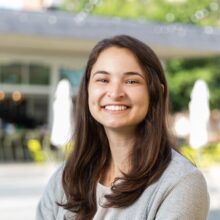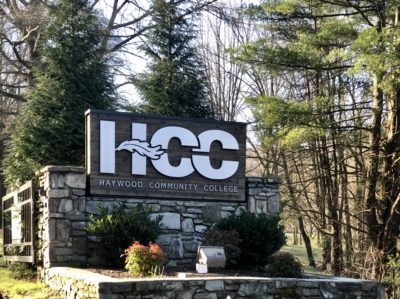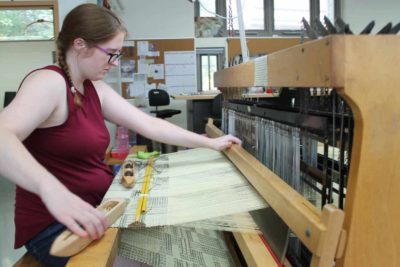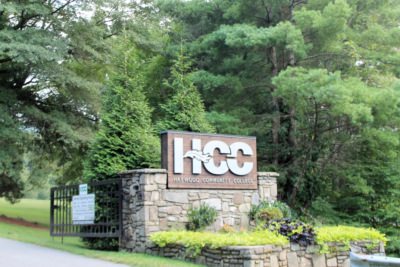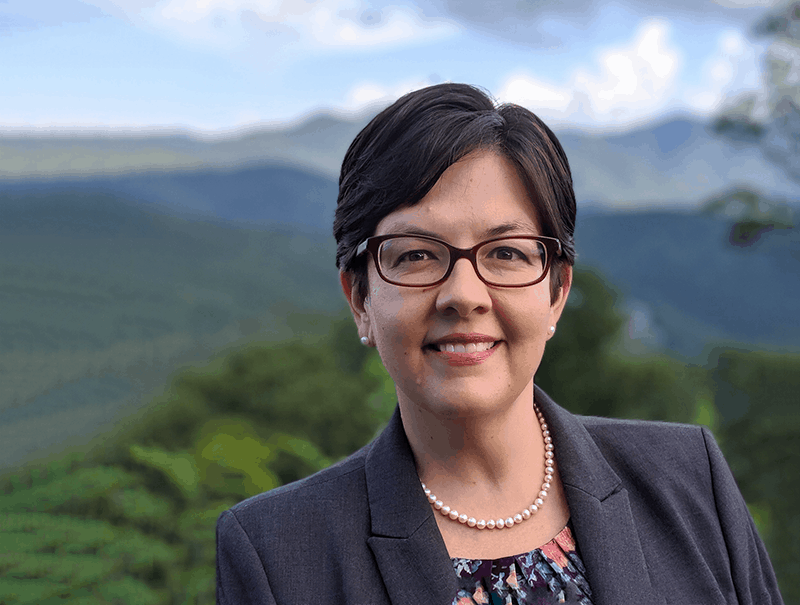

Shelley White became President of Haywood Community College on Jan. 1, 2020. I had the pleasure of meeting her and her team on my visit to Haywood Community College (HCC) in early March. As we toured the campus, the world was buzzing with news of COVID-19, and HCC was just beginning to make some tough decisions. She was at the head of that decision making process.
White serves as the seventh president of HCC. She comes to the college from A-B Tech in Asheville. White has spent the greater part of her career in Western North Carolina.
“I’ve just been so thankful,” White said. “I’ve received such a warm welcome. I think part of it, part of it comes from being a part of the community already. I’ve lived here in Haywood County for almost 17 years.”
I talked with White about her education journey, why she cares about community college education, and becoming a new president in the midst of a pandemic. Here’s the rest of our conversation. It has been edited for length and clarity.
Shelley White: My parents are both first generation college students in their families, and they met at college. But then my mom actually went back to school when I was in sixth grade to become a nurse. She went back to a four-year college and got a two-year associate degree in nursing [before her four-year degree]. Just seeing her going for that as a young child, it really instilled a value for education for me.
Alli Lindenberg: That makes a lot of sense. I know this is a new role for you, so to get started can you talk about what you were doing before you became president here?
SW: So as I mentioned, I’ve had 18 years in the community college system. Prior to this, I was vice president for economic and workforce development and continuing education at A-B Tech in Asheville. I had been at A-B Tech since 2001. I started as an instructor there in Human Resources Development, teaching short-term computer classes and job skills classes. When I was in graduate school at Western for my first graduate degree, which was in human resources, I worked at Haywood Community College as a GED and adult high school instructor. And so between the two I started to get my feet wet in the community college world and started to understand the breadth of what we do but also to have that student connection and interaction and to see the importance of those student pieces.
It’s been a wonderful, wonderful opportunity for me to be able to stay in Western North Carolina and stay in Haywood County. I’ve lived here for a long time and just that local connection, personal connection, but also within the field that I’ve come to love and be passionate about. I couldn’t ask for a better opportunity. It’s been a really exciting journey to get here.
AL: Can you tell us a little bit about yourself and what inspired you to become a leader in the education space?
SW: We were talking just a little bit about my family, so my parents met in college. They had that in common, and they were first generation college students within their own families. My dad’s a minister, and my mom is a retired nurse. As a young child, I remember my dad was pursuing a doctorate degree. I remember my mom helping him type up his thesis and everything was on typewriters back then, so that kind of dedication to achieving that goal was something that was instilled in me very early.
And then, of course, my mom, she had her bachelor’s degree in church music, which she used a little bit within the churches where my dad was a minister, but she was primarily a stay-at-home mom with me and my sister. In sixth grade, she decided to go back to school, and she wasn’t quite sure what she wanted to be or do when she grew up. So she took a class at a community college to help her with career awareness and development. She took some inventory assessments and things like that and determined that nursing was the field that she wanted to go into.
So she went back to school for nursing, and that was very much memorable to me in that setting a goal and going for that and knowing that education is something that could really change your life and your direction and your future.
AL: Since you’ve been at Haywood, what have you been doing? What’s been going on here?
SW: So I started January 1, or technically January 2, when we were back from the holidays. I really think it’s very important to get to know the campus and get to know the people and our program so that I can be the best representative possible. So, really, from day one my main focus is making sure that I carve out time for learning the campus and meeting people all across campus. I’ve had a chance to visit classes and make more connections with faculty and staff.
But at the same time, I’m an ambassador for the college and a representative for the college out in the community, which is so important. I’ve been connecting more out in the community and getting to know people in different leadership circles in areas where the college needs to be represented. So that’s been exciting for me as well. So the local campus focus as well as the community focus has really been my main priority.
As president you’re called on to make tough decisions and to be in that role, and I think as a new president, that’s probably one of the most challenging things. While you’re getting to know your way around campus and getting to know your technology set up, things are happening and you’re needing to move forward and be prepared to hit the ground running. You’re dealing with issues like we are now with how the campus will respond to a statewide, national, worldwide emergency situation. So it’s a very unique position.
AL: You spoke about the need to be decisive. What other skills and experiences have prepared you to be president? What skills are important to have as a leader of a community college?
SW: We talked earlier today about education being like building blocks and stackable things that you learn throughout your life. So my undergraduate degree is in psychology learning why are people the way they are and why do people make the decisions that they do? And how can we interact better together? I think that’s a critical component. And it’s something that helped me to understand people from a different perspective.
Then I have a master’s degree in human resources. And so that’s more of how people interact in the workplace and then expectations within that career development. I did a lot of training and development work during that time, which led me to connect with A-B Tech and get my foot in the door with community colleges.
So that perspective, developing leadership skills over time, communication, problem solving — things that sometimes you do take for granted because they’re so basic — these are the essential skills within really any leadership role. I think they’re part of the building blocks for what you would want to see in a president.
I feel like I have a pretty informal style speaking and relating to folks, and that seems to be well received. But so far, just getting to know everyone from a person-to-person level, I think it’s very important. Learning people — people’s names, their backgrounds, what led them here — I think it’s important that I care about that. I want to know about that so that I can be the best representative I can be.
Understanding our community college system is very important. And I’ve had the background from the level of an instructor, program coordinator, and director, and I’ve really seen all facets and different sides of how we operate. I understand our funding, how those pieces fit together, and how that can be sometimes challenging and unique. I think that’s very important and critical to have that background and knowledge.
The work I did most recently at A-B Tech was in economic and workforce development. Having those connections to that piece of what we do is so important because I think so much of what we do in the community college system is workforce development and supporting the economic development within your community. So I think that’s very critical and very important, particularly for Haywood Community College in that we’re the only community college in our county. We serve Haywood County and look at ways that we can better prepare the workforce for jobs in our area and in our region.
AL: What do you see as the biggest opportunities for Haywood?
SW: In my short time here, one of the things that I’ve observed is how well the campus community works together to achieve the goals of meeting the needs of students. Dropping into that kind of environment is very exciting in that it feels very supportive. It feels like a wonderful foundation to be able to grow from to move forward.
I think the opportunities that we have are to look at the needs within the community in terms of the workforce and how that’s shifted or changed with our new economy. I know we have a lot more travel and tourism in this area. We have opportunities to connect regionally and locally with outstanding job opportunities in manufacturing and ensuring that we’re positioned to be able to continue to meet those needs within our community. And then how can we put resources there to help? How can we make those goals come to fruition?
AL: What do you think are the biggest challenges?
SW: Coming from A-B Tech, one of the larger community colleges, to Haywood, which is a smaller community college, I think it’s interesting to see the difference in how things operate and how things work. And again, I’ve been very, very impressed with how Haywood utilizes the resources that they’re given.
I think being smaller is challenging in some respects — for example having access to funds and equipment for two new programs to startup. We have identified needs within workforce programming, technical and trades programs, and that kind of equipment is not inexpensive. Having access to funds that would keep our programs state of the art and as relevant as they can be for our students, I think that’s a challenge for us for sure.
AL: When you think about your time here, what are you most proud of so far?
SW: I’m most proud to be a part of the team at Haywood. I think that it’s hard for me to say anything about what I’ve done. I’m very, very new in this environment but very excited to be a part of the team.
One of the things that had an impact on me preparing to come here was back in the fall, I had a chance to meet with the executive team, the vice presidents here. They shared with me a book about the history of the college and about the early days of the college being formed. The book talks about the property that was donated for the college and the very intentional planning that came into place for Haywood to become the campus that it is. I was able to understand before I got here that Haywood was a very special place, and then I came here and experienced that, in both the physical place but also the people here, their cooperative spirit and willingness to work together. Once I was here and saw that, I was just almost overwhelmed with being able to be a part of such a great team.
AL: Is there anything else that you want to talk about that we didn’t ask you?
SW: So, one thing that I didn’t mention in my background is that I am also a community college graduate. I went to Isothermal Community College, and I think having that background helps me to understand the needs of our students. At the time that I was graduating from high school, my family, we weren’t quite in a position for me to go off to school, financially. And I think looking back on it, personally, I probably wasn’t quite ready to move off to school.
So I did a transfer degree, and I think it was a good fit for me at the time. It helped me to learn how to be a college student, and I got involved in Phi Theta Kappa. I had a couple of leadership opportunities at an early age. I think it was a good experience for me.
